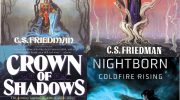 Alan Smale is an up and coming name in alternate history. His short story “A Clash of Eagles” won the 2010 Sidewise Award for Alternate History and was later expanded into a full-length novel titled: Clash of Eagles. Its sequel, Eagle in Exile, just came out recently and I had the opportunity to talk about it, Nova Hesperia and what Alan has next for us in the future. Check it out below:
Alan Smale is an up and coming name in alternate history. His short story “A Clash of Eagles” won the 2010 Sidewise Award for Alternate History and was later expanded into a full-length novel titled: Clash of Eagles. Its sequel, Eagle in Exile, just came out recently and I had the opportunity to talk about it, Nova Hesperia and what Alan has next for us in the future. Check it out below:
Welcome back to SFFWorld, Alan. In your own words, who is Alan Smale?
Alan Smale is a tall dark stranger with a dubious accent and a bag full of secrets.
Wait. Alan Smale is a writer, scientist, and singer. His novella of a Roman invasion of ancient America won the Sidewise Award, and he is the author of the Clash of Eagles trilogy of books set in the same universe. He is an astronomer at the NASA Goddard Space Flight Center, doing research into black holes and neutron stars, and managing an astrophysical data archive. He sings bass for high-energy vocal band, The Chromatics, and is co-creator of their educational AstroCappella project. Alan is British by birth and American by choice; a history buff and collector of useless knowledge; a reader and a wine drinker; an introvert, but hopefully a good friend. His office is incredibly messy but the files on his laptop are very well organized.
The second book in your Clash of Eagles trilogy was recently published. What’s next in store for Gaius Marcellinus in Eagle in Exile?
As Eagle in Exile begins, Gaius Marcellinus is living in the mound city of Cahokia, located roughly where St Louis is today. It’s the early thirteenth century, and the Mississippian culture is at its zenith. Cahokia is a city of some 20,000 people, covering five square miles, but it has just suffered major damage and destruction as a result of its Mourning War with the Iroqua people of the Great Lakes. As for Marcellinus himself, he has decidedly mixed feelings about his role in all this. He is struggling for understanding, both of the local political situation between the tribes and nations of Nova Hesperia, and of what he should do next.
He wants to bring peace to the land, and he does his best, but – as you might imagine from the book title – events don’t unfold the way he would like. He is banished from Cahokia, forced to endure a nomadic existence on the Mizipi River. The Land is divided, and the legions of Rome will surely be back soon. He and his friends are in a terrible situation.
That poor guy. Sometimes I feel sorry for him.
In a previous interview, you mentioned the huge amount of research you did to build your alternate timeline. Any books you can recommend to those who would like to learn more about Rome and Native American cultures?
Certainly! For an overview of North America prior to the Columbus voyages, readers could start where I did, with 1491 by Charles C. Mann. For Cahokia itself, two books provide a great intro: Ancient Cahokia and the Mississippians and/or Cahokia: Ancient America’s Great City on the Mississippi, both by Timothy Pauketat. I learned a lot from The Iroquois by Dean Snow, One Vast Winter Count by Colin Calloway and Facing East from Indian Country by Daniel K. Richter. And then there are more academic texts. For the topography and layout of Cahokia I relied on The Cahokia Atlas: A Historical Atlas of Cahokia Archaeology by Melvin Fowler. And for how people from Europe navigated their way around North America, and the challenges they faced, Undaunted Courage by Stephen Ambrose and Wicked River: The Mississippi When It Last Ran Wild by Lee Sandlin were pretty useful.
I’ve been reading about Rome all my life – overall history, everyday life, battle tactics, methods of travel – and that makes it harder to pull out favorites. The Complete Roman Army by Adrian Goldsworthy is one. General texts like A Day in the Life of Ancient Rome by Alberto Angela and Everyday Life in Ancient Rome by Lionel Casson provide useful entrance points. But mostly what I read for the Clash of Eagles books were specific volumes that focused on details of Roman legionary clothing and uniforms, personal weapons and siege engines, ships, in-depth studies of particular battles or overall legionary strategy, and so forth. And although it’s not about Rome, John Keegan’s The Face of Battle comes closer than anything else I’ve read to exploring the visceral sensations of battle, how it might have felt to the participants, and what their mental and physical states were likely to be.
It’s hard to know where to stop with a list like this. I provide appendixes in the back of both Clash and Exile with lists of the books I found most useful while writing each.
I just finished Clash of Eagles and I am half way through Eagle in Exile. I have been intrigued by the Cahokians’ use of gliders. Was this a technology they used in our timeline?
In almost every way, I tried to make my fictional Cahokia as true as possible to the Cahokia we know from archaeological and anthropological studies. The layout and appearance of mounds within the city, the style of the Mississippian huts and longhouses, their food and clothing, and their skills with wood, metal, and pottery were all as accurate as I could make them. The most significant exception, and the main speculative element that I allowed myself in writing the Clash of Eagles books, is their development of flight.
There’s no doubt that the Mississippian culture – along with many other cultures in pre-contact North America – were fascinated by birds, and by flying. Falconoid images and bird eyes, wings, and tails feature prominently in Mississippian art, including full birdman imagery – humans portrayed with birdlike wings. In all likelihood, Cahokia had a birdman cult. Given their skills with wood, skins, and sinew, and given their conveniently high mounds, it seemed like a short step from birdman symbolism to a real, pragmatic attempt at flying.
In our world there’s no archaeological evidence that the Mississippian cultures ever tried something like this. Then again, if they had, the wood and the skins that made up their Hawk gliding craft wouldn’t have survived in the archaeological record anyway… so it’s fun to speculate.
In your opinion, which is the better wall: Hadrian’s Wall or the Great Wall?
The lesson I learned from studying both walls is that walls are a really bad way of controlling or protecting populations, unless they’re encircling a small area and they’re pretty darned high. Neither Hadrian’s Wall nor the Great Wall achieved their goals for any length of time, if at all. But, having been to both, I have to say that the Great Wall is far and away the more impressive.
Besides the setting of Clash of Eagles, do you have any other favorite what if questions?
I spend an unhealthy amount of time considering what-ifs and other historical scenarios. Given my European background I’ve pondered alternative types of nineteenth century that Britain and France could have had. What actually happened, with the cataclysm of the French Revolution being followed by a dazzling volte-face back into the Imperial dictatorship of Napoleon, is tricky for historians to explain even today. No one could have predicted it. Similarly, Britain in the nineteenth century could easily have been much more revolutionary and bloody than it was. Revolutions were cascading all over Europe but Britain largely dodged that bullet, for reasons that are also less clear than might be supposed.
I tend not to dwell on alternate versions of the Second World War or the American Civil War. My what-if interests generally start earlier than that. I think a lot about how different the world would be if different cultures had come to the fore. I’ve written elsewhere that I don’t think the fall of Rome was a foregone conclusion. Other great civilizations may not have risen or fallen on the schedule that they did in our world. Major historical developments look inevitable in hindsight, as if they possessed a huge momentum, but the closer you look, the more they appear to rest on rather fragile underpinnings.
What if the Greeks had lost the Battle of Salamis in 480 BC, or the Battle of Plataea a year later? What if Alexander the Great hadn’t died so young, and so unexpectedly? What if Rome hadn’t decided to wipe the Carthaginians from the face of the earth? Rome and the Parthian Empire had a series of major wars, many of which might have had very different outcomes based on rather subtle circumstances. The success or failure of the American Revolution hinged on some quite nuanced events and personalities, and on events that were happening in other parts of the world. Those are just examples from the areas I’ve been reading about most recently; there are similar potential hinge-points all across Asian, South American, and African history where a small change would have radiated out through the ages to totally change the world we know now. We’re learning more every year about particular historical events and about the process of history itself.
Then again, I can’t even watch the Superbowl without thinking that if such-and-such a player had made a very slightly different spur-of-the-moment decision, the whole game after that instant might have turned out differently. I’m curious to know whether any alt-hist writers are really capable of enjoying sports.
Since you are an astronomer and work for NASA, can we expect any hard SF from you in the future? Possibly an alternate history of the space race?
Wow. Good guess! I’m close to finishing the third book in the Clash series, Eagle and Empire, and several people are asking me what I’ll be following it up with. I don’t yet have a good solid answer, but the main ingredients bubbling up in my mental stew at the moment are harder SF than Clash, and the one I’m spending most time thinking about is indeed a different style of near-Earth space race with, shall we say, different cultures in the pilot seats. I’ve been thinking quite a lot about how to make that work. Even if I don’t attempt it at book length, I’ll almost certainly try a short story or novella in that kind of milieu.
Any advice for would be writers?
It’s not terribly profound, but: keep at it. “Never give up, never surrender.” Good writing takes a lot of practice. The old cliché about everyone having a million words of crap inside them that they need to exorcise before the good stuff starts coming out? I think that’s true. It certainly was for me.
Don’t wait for the perfect moment or mood. Write whether you feel like it or not. Squish it into whatever part of the day you can. Writing is a muscle, and you have to keep exercising it.
And read. A lot. That will help prevent you from falling into the obvious answers, the easy traps. When you’re plotting, don’t make the obvious decision. Throw away the first five ideas for how to resolve the plot. Twist and twist again.
* * * * * * *
Interview by Matt Mitrovich – SFFWorld.com © 2016




